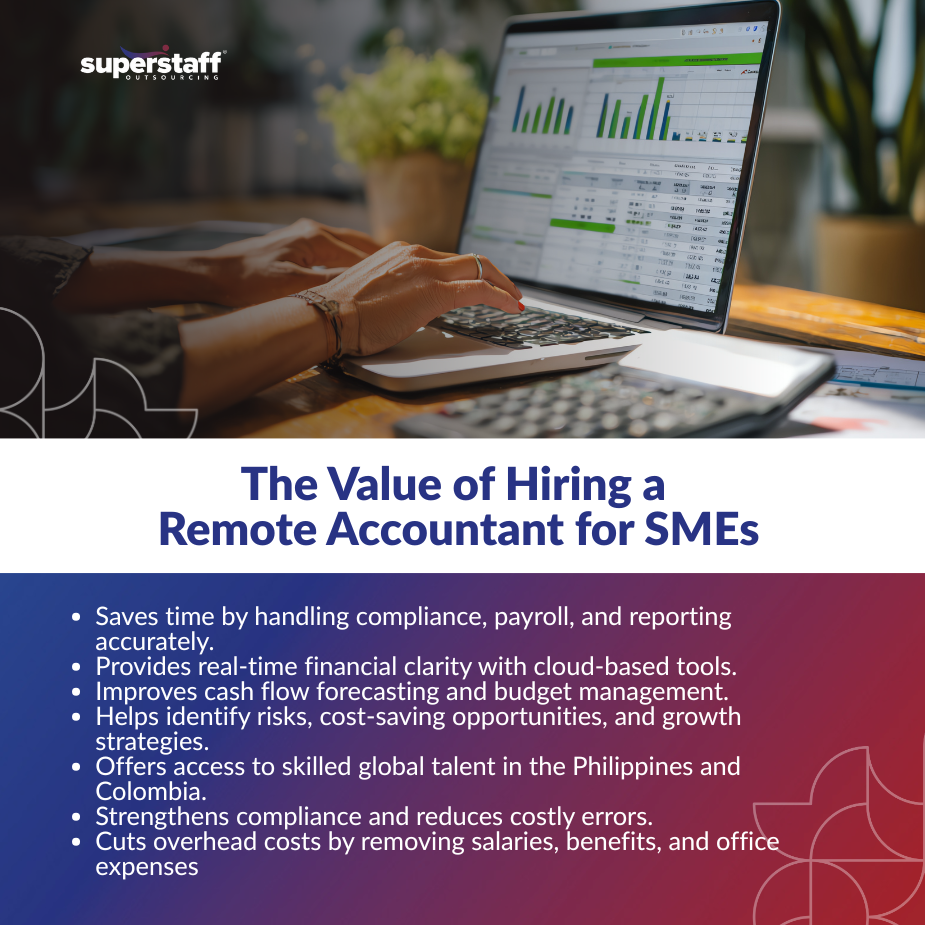
Small and mid-sized enterprises (SMEs) often feel the pressure of doing more with less. Rising costs, economic uncertainty, and increasingly complex financial demands leave many business owners caught in a balancing act, trying to manage growth while keeping their books accurate and compliant.
The challenge is that accounting is not just about recording numbers; it requires precision, efficiency, and a deep understanding of evolving regulations. For many SMEs, building a full in-house team isn’t practical, but overlooking proper financial management can be costly. This is where hiring a remote accountant becomes a strategic advantage.
Offering both cost savings and sharper financial clarity, remote accountants are reshaping how SMEs approach their finances. In 2025, turning to remote accounting isn’t just a smart option; it’s quickly becoming the smartest financial decision an SME can make.
Financial management challenges have become one of the biggest hurdles for SMEs in 2025
Are you wondering why SMEs should hire a remote accountant in 2025? Here are just a few of the most pressing reasons:
For SMEs, financial management has never been more complex than it is today. Between new tax rules, increased government oversight, and the pressure to remain agile in an uncertain economy, businesses are spending more time and money than ever just to stay compliant. Regulations are tightening across industries, forcing companies to adopt stricter accounting practices that go far beyond basic bookkeeping.
The problem is that many SMEs lack the in-house expertise to manage this effectively. Hiring a full team of accountants often stretches budgets too thin, while asking existing staff to “wear many hats” leads to costly mistakes. For example, a business owner who tries to manage payroll alongside sales and operations may inadvertently miscalculate tax withholdings, resulting in fines or employee dissatisfaction. Another common issue is late filings; when accounting tasks get pushed to the side, SMEs face penalties that eat into their already slim margins.
Every hour spent reconciling accounts or correcting errors is an hour not spent on growth, customer service, or innovation. Many SMEs discover that DIY accounting actually costs them more in the long run, both in money and lost opportunities.
This is exactly why companies hire a remote accountant. By outsourcing these tasks to a qualified professional, SMEs eliminate the inefficiencies of internal trial-and-error. The challenges that once drained resources now become opportunities for strategic improvement.
Hiring a remote accountant drastically reduces overhead costs for SMEs
One of the biggest appeals of hiring a remote accountant is the immediate reduction in overhead. Full-time, in-house accountants come with not only salaries but also a long list of associated expenses: health benefits, retirement contributions, office space, software licenses, and ongoing training. For SMEs, these costs can add up to tens of thousands of dollars annually.
In contrast, a remote accountant operates on a more flexible model. Businesses can choose between project-based arrangements, part-time support, or full-scale outsourced teams—paying only for the services they truly need. This flexibility is especially valuable for SMEs that experience seasonal fluctuations or unpredictable workloads. Instead of carrying the financial burden of a permanent hire year-round, they can scale accounting support up or down as required.
For instance, a retail SME preparing for the holiday rush may need intensive financial oversight during Q4 but only minimal support during quieter months. With a remote accountant, this scaling happens seamlessly. The cost savings with remote accounting services free up resources that SMEs can redirect toward growth initiatives like marketing, product development, or technology upgrades.
But cost savings are only half the story. A remote accountant also delivers higher-quality insights than many businesses can achieve on their own.

Remote accountants bring clarity to financial operations with advanced tools and expertise
The modern remote accountant is far more than just a bookkeeper working from a distance. Equipped with advanced tools and global expertise, they bring clarity and precision to financial operations that most SMEs could not access in-house.
Cloud-based accounting platforms like QuickBooks Online, Xero, and NetSuite allow remote accountants to provide real-time visibility into a company’s finances. This means business owners no longer wait until the end of the month or quarter to know their cash position; they can access updated dashboards daily. The value of this clarity cannot be overstated—it empowers leaders to make informed decisions with confidence.
Providers offering remote accounting services also leverage data-driven financial reporting. Instead of simply reconciling accounts, they analyze spending patterns, revenue streams, and budget variances to highlight areas where the business can save or grow. For example, they might identify that a company is overpaying vendors or carrying unnecessary inventory, enabling the SME to reduce costs and free up working capital.
Compliance is another area where remote accountants excel. Automated tools help flag potential issues before they become problems, ensuring businesses meet tax obligations and industry standards proactively. This proactive approach prevents the stress of last-minute scrambles and costly mistakes.
In short, a remote accountant doesn’t just tidy up the books—they create a roadmap for smarter, more transparent financial management.
Remote accountants empower SMEs to make smarter business decisions
The true value of a remote accountant lies not only in recordkeeping but also in their ability to serve as strategic advisors. They help SMEs move beyond survival mode and start planning for long-term growth.
For example, a remote accountant can provide scenario planning: What happens if raw material prices increase by 10 percent? What if sales dip unexpectedly in Q2? These insights allow business owners to prepare for multiple outcomes, reducing risk and improving resilience.
Budgeting support is another critical function. Many SMEs operate without formal budgets, relying instead on instinct or rough projections. A remote accountant helps build detailed budgets that align spending with business goals, ensuring money is allocated to the areas with the greatest return on investment.
Risk assessment rounds out this strategic toolkit. Whether it’s monitoring debt levels, assessing the impact of currency fluctuations, or advising on expansion plans, a remote accountant offers an external perspective grounded in numbers. Their objective analysis often uncovers opportunities or red flags that internal teams may overlook.
This level of strategic input is why SMEs increasingly view remote accountants not just as service providers but as trusted partners. And as outsourcing grows globally, these partnerships are becoming more powerful than ever.
The rise of remote work and outsourcing has made global accounting talent more accessible than ever
The remote work revolution has broken down geographic barriers, making top-tier accounting talent available to SMEs worldwide. Today, a small business in Chicago or London can easily hire a highly skilled remote accountant based in the Philippines or Colombia, gaining expertise at a fraction of the cost of hiring locally.
Countries like the Philippines have long been recognized as outsourcing leaders, with a strong pool of English-speaking professionals trained in Western accounting standards. Colombia is emerging as another attractive hub, offering bilingual talent, time-zone alignment with North America, and a rapidly growing outsourcing sector. Both regions combine cost-effectiveness with cultural compatibility, making them ideal destinations for SMEs seeking reliable accounting support.
By tapping into this global talent pool, SMEs not only save money but also gain access to accountants who are familiar with international frameworks like GAAP and IFRS. This global perspective is increasingly important for SMEs that operate across borders or aspire to expand internationally.
The accessibility of remote accountants ensures that even smaller businesses can compete with larger firms by maintaining world-class financial management. This democratization of expertise is reshaping the SME landscape in 2025.
The evidence is clear: SMEs that embrace remote accounting are better positioned for sustainable success.
Ensure Accurate Financial Record-Keeping With SuperStaff’s Remote Accountant Solutions
Hiring a remote accountant in 2025 is no longer just about cutting costs—it’s about unlocking clarity, strategy, and growth potential. SMEs that once felt burdened by financial complexity now have an accessible, flexible solution that combines affordability with high-level expertise.
By reducing overhead costs, providing real-time financial insights, enabling smarter decisions, and opening access to global talent, remote accountants have become indispensable partners for SMEs worldwide. They deliver the financial clarity that businesses need to not just survive but thrive in today’s competitive economy.
For SMEs, the choice is clear. A remote accountant is not just a short-term fix; it’s a long-term growth strategy. Partnering with trusted providers like SuperStaff ensures that businesses gain both the expertise and the reliability they need to scale with confidence in 2025 and beyond.






